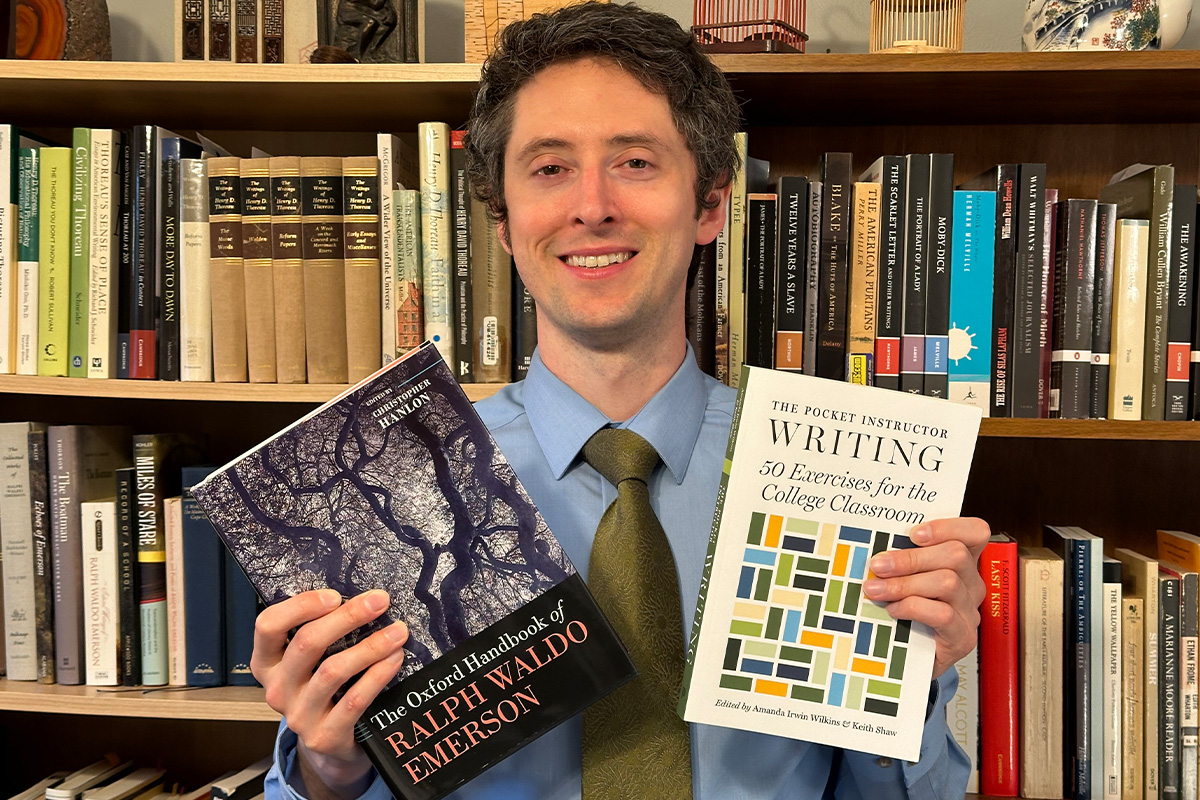Published October 30, 2024

CAPTION: ULM Assistant Professor of English Dr. Patrick Morgan was recently featured in publications
from Princeton University Press and Oxford University Press.
MONROE, LA – Imagine sitting down to analyze a poem in your college English class, then being handed
a rock as well. That’s what it’s like taking a class with Dr. Patrick Morgan, Assistant
Professor of English at the University of Louisiana Monroe. A lesson Morgan teaches
on reading rocks and poetry has been published by Princeton University Press as a
book chapter titled, “Rock Your Classroom,” in The Pocket Instructor: Writing. This lesson stems from his larger commitment to interdisciplinary research, studying
the connections between geology and literature, including two additional book chapters
published recently by Oxford University Press.
The Pocket Instructor: Writing compiles fifty active learning lessons from around the country introducing students
to academic writing across the humanities and sciences. As the volume’s editors write,
“To teach academic writing is to teach thinking—that is to say, every step that goes
into creating an insightful, rigorously argued essay. Success lies in teaching students
not simply to answer questions but to ask their own, to follow their curiosity and
question their assumptions” (2). The book contains instructions and reflections for
how to teach writing across every stage of the process, from building an idea, drafting,
revising, and transferring academic writing into other forms of writing. Although
the lessons are geared toward the college classroom, they are also adaptable to high
school classrooms.
“My lesson focuses on teaching students different ways of writing in the humanities
and sciences, via poems and rocks,” says Morgan. “The lesson gets students actively
thinking about what it means to write about primary texts in different disciplines.
How do literary scholars analyze a poem and how do geologists analyze a rock? How
can juxtaposing these two approaches help us think about the larger connections and
differences across the humanities and sciences?”
As Morgan explains in his chapter, “I’ve found this exercise especially valuable because
it challenges students’ conceptions of a ‘text,’ broadening the horizon of what qualifies
as a primary object of study. [...] By seriously considering sedimentary rocks as
texts, we can illuminate central issues regarding interpretation, such as intention
and how we read ‘the human’ vs. ‘the non-human.’ Ultimately, I want students to walk
away with a larger sense of the kinds of things poems say, the kinds of things rocks
say, and the ability to radically reimagine the way they look at a text” (38-39).
“So seamlessly does Dr. Morgan’s exercise progress from the ‘pithy’ to the profound
that, by the end of a ‘rockin’ class, students will marvel at the transformative power
of writing,” says Dr. Janet Haedicke, Professor of English at the University of Louisiana
Monroe. “I suspect that, long after such a class, they will be reading themselves
and their worlds as texts with beautifully ‘porous dotted lines.’”
The published lesson “clearly shows that fundamental scholarship is not disconnected
from applied scholarship,” says Dr. John M. Pratte, Dean of the College of Arts, Education,
and Sciences. Indeed, this lesson has been published around the same time as two
other book chapters focusing on geology’s connections with literature. Published
this summer, TheOxford Handbook of Ralph Waldo Emerson contains Morgan’s chapter about the way Emerson connected geology with his fight
against slavery. The chapter is titled, “Transcendental Geologies: Emerson, Anti-Slavery,
and the Kairos of Deep Time.” Later this semester, a long-term project comprehensively summarizing
the history of American literature’s relationship with geology will be published as
a chapter, “Geology in American Literature,” in The Oxford Research Encyclopedia of Literature.
If the history of science and its connections with literature intrigues you, read
more about Morgan’s research in the links below.
Links for Further Reading
“Rock Your Classroom” in The Pocket Instructor: Writing: < https://press.princeton.edu/books/hardcover/9780691173955/the-pocket-instructor-writing >
“Transcendental Geologies: Emerson, Anti-Slavery, and the Kairos of Deep Time” in The Oxford Handbook of Ralph Waldo Emerson: < https://doi.org/10.1093/oxfordhb/9780192894373.013.5 >
“Geology in American Literature” in The Oxford Research Encyclopedia of Literature [to be published later this semester, link will become active upon publication]:
< https://doi.org/10.1093/acrefore/9780190201098.013.1353 >
For further information, please contact Patrick Morgan at pmorgan@ulm.edu.

